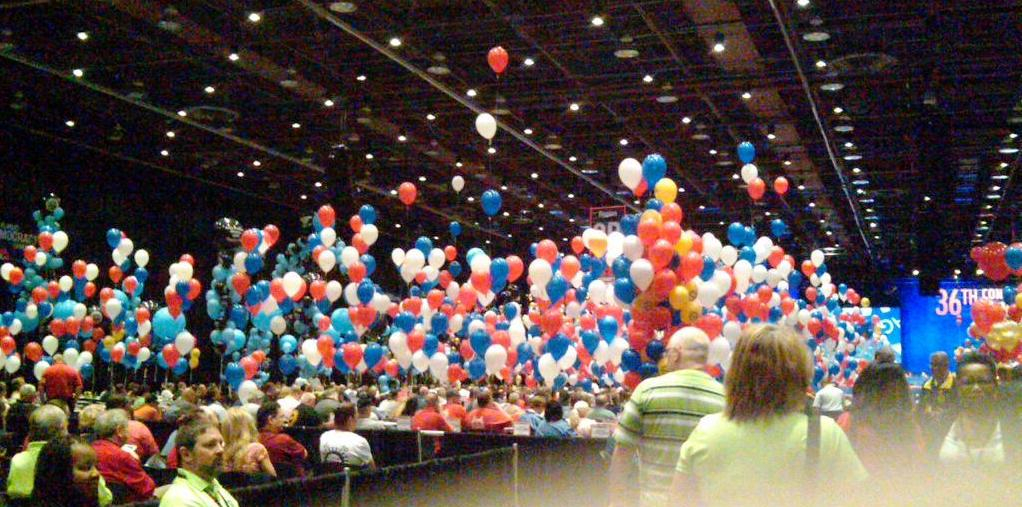Autoworker Dues Increase Stirs Convention Debate

UAW convention-goers sitting in the bleachers June 4 found that balloons obscured their view of whoever was speaking. Even at the heavily stage-managed event, members managed a healthy debate over the proposed dues increase—though it ultimately passed in a hand vote. Photo: Judy Wraight.
It was a beautiful day, and a relaxed atmosphere, in front of Detroit’s Cobo Hall Center June 1 as delegates arrived to register for the 36th UAW Constitutional Convention. The delegates would elect new international union leadership and consider changes to the union’s constitution that called for an increase of dues from 2 to 2.5 hours of pay per month.
A possible obstacle to smoothly achieving the top brass’s goals was the group of demonstrators standing across the street, chanting “let the members decide.”
The rally was organized by Autoworker Caravan, a reform group that proposed to require a referendum vote of all members before increasing union dues. Another of its demands: that top UAW leadership be elected directly by rank-and-file members.
Most important, the demonstrators were calling on the UAW leadership to return to a more militant stance when contract negotiations with the Big 3 begin next year. Eliminating two-tiered wages and benefits for new and recently hired workers is a top concern.
No More Tiers
Wendy Thompson, retired Local 235 president, was on hand to voice her opposition to two-tier. She said that the union should return to the principle of equal pay for equal work—and that rank-and-file participation would be required to rebuild a fighting union spirit.
Gary Walkowicz of Local 600 Dearborn truck plant was there, too. A well-liked bargaining committeeperson with 18 years of elected union experience, he was mounting a symbolic bid for the UAW presidency. The overwhelming majority of top leadership positions on the union’s international executive board are won without challenge, by acclamation.
“There is a lot of dissatisfaction and even anger against the policies the international has been pursuing the last few years, giving up concessions. The dues increase is a symptom of a leadership that’s out of touch,” Walkowicz said.
“The business of the convention should be, how do we fight to get back the concessions that have just made the members poorer and given money to the stockholders,” he said.
UAW leadership said the dues increase was necessary to win good contracts. Opponents criticized continuing diversions of money from the strike fund, and advocated that the dues decision should be made by the membership in a referendum vote.
Strategizing
The demonstrators and interested convention delegates met after the rally to plan convention strategy at Detroit’s Anchor Bar, a center for activists since the newspaper strike of 1995-2001.

SUPPORT LABOR NOTES
BECOME A MONTHLY DONOR
Give $10 a month or more and get our "Fight the Boss, Build the Union" T-shirt.
Some of that strategy concerned changing convention rules, which prevent the amending of resolutions from the convention floor. Participants also talked about how to bring to the floor for debate resolutions that had been submitted, but had not made it into the convention resolution book—for instance, the one to allow direct election of top officers.
The meeting included not only traditional autoworkers but also representatives of the non-traditional sector, such as graduate employees at universities. Eric Hoyt and Luke Pretz of the University of Massachusetts and Sunny Lim of the University of California represented these workers, and shared their thoughts on class size, compensation, and organizing strategy.
The nontraditional sector accounts for much of the UAW’s growth in recent years. The union’s recent efforts to organize autoworkers in Tennessee, Alabama, and Mississippi have been fruitless so far.
Reformers Rebuffed
The reformers were rebuffed on the convention floor, although members managed a healthy debate on the proposed dues increase. Such debate is very unusual at these conventions. Despite pressure from the union’s leadership, many delegates confidently got up and said the members they represented were against an increase. Still, the increase passed by a show of hands, about 2 to 1.
The resolution for the direct election of international officers was not debated because proponents didn’t have enough votes to bring it to the floor. “One member, one vote” is opposed by the union’s officialdom. And when a delegate nominated Walkowicz for the presidency, some delegates used noisemakers to drown out the nominating speech.
Delegates left the convention with a new president, Dennis Williams, who served as secretary-treasurer under outgoing president Bob King. Williams’s message called for no more concessions, eliminating two-tier wages, and winning gains for new hires and seniority workers alike. Of course, King also claimed he opposed two-tier. The question is whether the union has a serious strategy to defeat it.
The convention ended with Williams repeating the slogan “It’s our time!” If the leadership delivers on its pledge to win real gains for UAW members, workers will shout, “It’s about time!”
Alex Wassell is a welder repair technician at Warren Stamping and a member of UAW Local 869.
CORRECTION: The original version of this article said the dues increase passed on a voice vote. The article and caption have been corrected to reflect that it was a hand vote.





